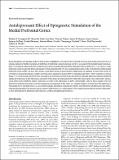| dc.contributor.author | Covington III, Herbert E. | |
| dc.contributor.author | Lobo, Mary Kay | |
| dc.contributor.author | Maze, Ian | |
| dc.contributor.author | Vialou, Vincent | |
| dc.contributor.author | Hyman, James M. | |
| dc.contributor.author | Zaman, Samir | |
| dc.contributor.author | LaPlant, Quincey C. | |
| dc.contributor.author | Mouzon, Ezekiel | |
| dc.contributor.author | Ghose, Subroto | |
| dc.contributor.author | Tamminga, Carol A. | |
| dc.contributor.author | Neve, Rachael L. | |
| dc.contributor.author | Deisseroth, Karl | |
| dc.contributor.author | Nestler, Eric J. | |
| dc.date.accessioned | 2011-06-16T18:39:58Z | |
| dc.date.available | 2011-06-16T18:39:58Z | |
| dc.date.issued | 2010-09 | |
| dc.date.submitted | 2010-09 | |
| dc.identifier.issn | 0270-6474 | |
| dc.identifier.uri | http://hdl.handle.net/1721.1/64463 | |
| dc.description.abstract | Brain stimulation and imaging studies in humans have highlighted a key role for the prefrontal cortex in clinical depression; however, it remains unknown whether excitation or inhibition of prefrontal cortical neuronal activity is associated with antidepressant responses. Here, we examined cellular indicators of functional activity, including the immediate early genes (IEGs) zif268 (egr1), c-fos, and arc, in the prefrontal cortex of clinically depressed humans obtained postmortem. We also examined these genes in the ventral portion of the medial prefrontal cortex (mPFC) of mice after chronic social defeat stress, a mouse model of depression. In addition, we used viral vectors to overexpress channel rhodopsin 2 (a light-activated cation channel) in mouse mPFC to optogenetically drive “burst” patterns of cortical firing in vivo and examine the behavioral consequences. Prefrontal cortical tissue derived from clinically depressed humans displayed significant reductions in IEG expression, consistent with a deficit in neuronal activity within this brain region. Mice subjected to chronic social defeat stress exhibited similar reductions in levels of IEG expression in mPFC. Interestingly, some of these changes were not observed in defeated mice that escape the deleterious consequences of the stress, i.e., resilient animals. In those mice that expressed a strong depressive-like phenotype, i.e., susceptible animals, optogenetic stimulation of mPFC exerted potent antidepressant-like effects, without affecting general locomotor activity, anxiety-like behaviors, or social memory. These results indicate that the activity of the mPFC is a key determinant of depression-like behavior, as well as antidepressant responses. | en_US |
| dc.description.sponsorship | National Institute of Mental Health (U.S.) | en_US |
| dc.description.sponsorship | AstraZeneca (Firm) | en_US |
| dc.description.sponsorship | Merck Research Laboratories | en_US |
| dc.description.sponsorship | PsychoGenics (Firm) | en_US |
| dc.description.sponsorship | Brain and Behavior Research Foundation (NARSAD Young Investigator Award) | en_US |
| dc.language.iso | en_US | |
| dc.publisher | Society for Neuroscience | en_US |
| dc.relation.isversionof | http://dx.doi.org/10.1523/jneurosci.1731-10.2010 | en_US |
| dc.rights | Article is made available in accordance with the publisher's policy and may be subject to US copyright law. Please refer to the publisher's site for terms of use. | en_US |
| dc.source | SFN | en_US |
| dc.title | Antidepressant Effect of Optogenetic Stimulation of the Medial Prefrontal Cortex | en_US |
| dc.type | Article | en_US |
| dc.identifier.citation | Covington III, Herbert E. et al. "Antidepressant Effect of Optogenetic Stimulation of the Medial Prefrontal Cortex." The Journal of Neuroscience, 1 December 2010, 30(48): 16082-16090. | en_US |
| dc.contributor.department | Massachusetts Institute of Technology. Department of Brain and Cognitive Sciences | en_US |
| dc.contributor.approver | Neve, Rachael L. | |
| dc.contributor.mitauthor | Neve, Rachael L. | |
| dc.relation.journal | Journal of Neuroscience | en_US |
| dc.eprint.version | Final published version | en_US |
| dc.type.uri | http://purl.org/eprint/type/JournalArticle | en_US |
| eprint.status | http://purl.org/eprint/status/PeerReviewed | en_US |
| dspace.orderedauthors | Covington, H. E.; Lobo, M. K.; Maze, I.; Vialou, V.; Hyman, J. M.; Zaman, S.; LaPlant, Q.; Mouzon, E.; Ghose, S.; Tamminga, C. A.; Neve, R. L.; Deisseroth, K.; Nestler, E. J. | en |
| dc.identifier.orcid | https://orcid.org/0000-0002-3854-5968 | |
| mit.license | PUBLISHER_POLICY | en_US |
| mit.metadata.status | Complete | |

